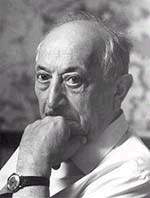Simon Wiesenthal, hunter for Nazi murders, dies at age 96
When Simon Wiesenthal was rescued from the Nazi captivity during WWII, he weighed only 45 kilos

Simon Wiesenthal, the man who spent 60 years of his life searching for Nazi criminals and founded the center to capture them and bring them to trial, died in Vienna yesterday at age 96. Over 1,100 Nazi murderers, who managed to survive in WWII, were judged and put into prison owing to Simon Wiesenthal's activities. Mr. Wiesenthal was condemning all displays of Nazism in the up-to-date society until his dying day. 
Wiesenthal was born on 31 December 1908 in Buczacz, Galicia, an autonomous region of the Austro-Hungarian Empire, in a Jewish family of limited means. In 1928 he set off to study in Prague, and was awarded a diploma of an architectural engineer in 1934. Afterwards he settled in the city of Lvov, which used to be the Polish territory in 1919-1939. The German troops occupied the city in June of 1941.
Wiesenthal was cooperating with Polish partisans. He managed to avoid execution, although Nazis killed his parents, brothers and sisters. Simon Wiesenthal was arrested in 1942: the man and his wife were sent to a concentration camp in Janowska, near Lvov, where he worked in repairing shops of Ostbahn – the Eastern Railway. When Nazis started exterminating the prisoners of the camp in October of 1943, Wiesenthal escaped from the camp, but was later captured and returned to Janowska. In 1944, when Soviet troops started liberating Western Ukraine, Nazi troops began moving their prisoners westwards. In 1945 Wiesenthal found himself in Austria's Linz, which was subsequently liberated from the German occupation by American troops. When Simon Wiesenthal was rescued from the Nazi captivity, he weighed only 45 kilos.
When the war was over, he remained in Austria and decided to take revenge upon those Nazi butchers, who managed to avoid any tribunals. In 1947 Wiesenthal founded the Jewish Historical Documentation Center in Linz, which was subsequently closed in 1954. The majority of the documents, which the center collected during seven years of its activity, were handed over to Israel. When staying in Vienna in 1961, Simon Wiesenthal founded another center to collect evidence against Nazi criminals. By 2005 the center had collected over 22,000 files of Nazi murderers who stayed alive after the completion of WWII. Having the basic occupation in the documentation center, Wiesenthal was cooperating with special services of Israel, the USA and Western Germany.
Wiesenthal's prime enemy in his search was Adolf Eichmann, the SS desk murderer, who turned the mass extermination of Jews in the Third Reich into an organized industry. Hitler declared Eichmann the senior expert on the Jewish issue in 1934. Several years later Eichmann became the person behind the construction of numerous concentration camps, in which over six million Jews and the same number of people of other nationalities (the Slavs, first and foremost) were killed.
Wiesenthal traced Adolf Eichmann at the end of the 1950s in Argentina. Israel's Intelligence, the Mossad, conducted a special operation to steal the Nazi from his new home. The Supreme Court of Israel sentenced Eichmann to death penalty: the Nazi murderer was executed on 31 May 1961.
Working for Israel, the USA and Germany, Wiesenthal managed to find and bring to court a large number of Nazi criminals of both German and other nationalities. Soon after the successful completion of the Eichmann case, Weisenthal succeeded in arresting policeman Silberbauer, who killed a Jewish girl named Anna Frank from Rotterdam. The girl became known for her diaries that she wrote living in a local ghetto. In 1966 Wiesenthal captured nine other Nazis including the chairman of the bestial concentration camp in Treblinka, Franz Strangl. A year later Simon Wiesenthal published a book titled “The Murderers Amongst Us.” Perhaps Wiesenthal's greatest disappointment was the escape of Hitler's confidant, Martin Borman.
Wiesenthal has received numerous awards during his life from Austria, France, Holland, the US Congress, the UN, etc. In 2004 Simon Wiesenthal was named “Knight of the British Empire.”
Simon Wiesenthal retired at age 95. However, he continued his life work until his dying day. He persistently criticized the politics of double standards and harshly condemned demonstrations of SS veterans in Latvia's Riga and the erection of a monument to Estonian SS legionaries in Tallin, Estonia.
Israeli President Moshe Katzav has already promised to open Simon Wiesenthal's museum in Tel Aviv in 2007. A similar promise followed from the President of Austria Heinz Fischer.
Ivan Shmelev
Subscribe to Pravda.Ru Telegram channel, Facebook, RSS!


